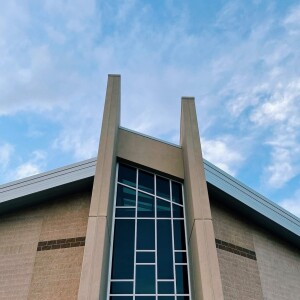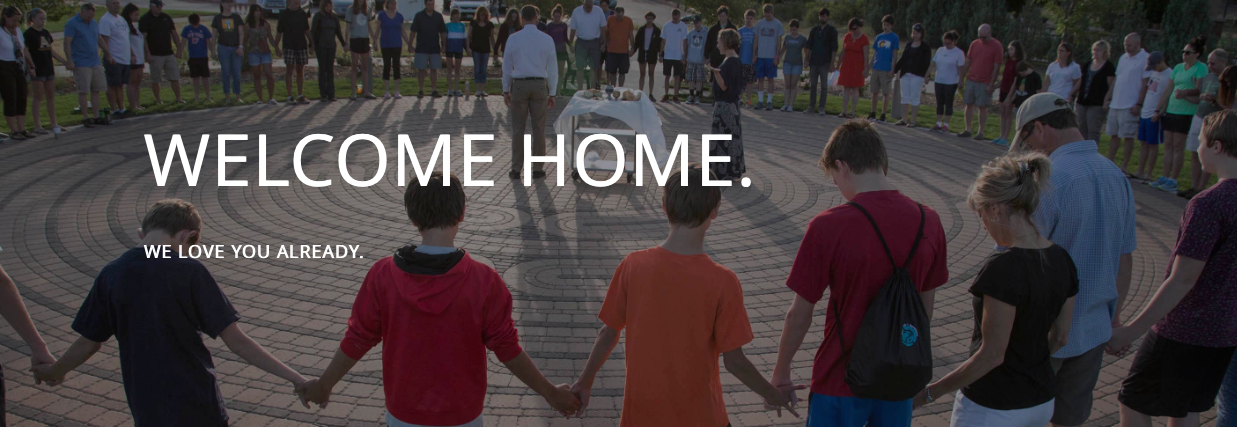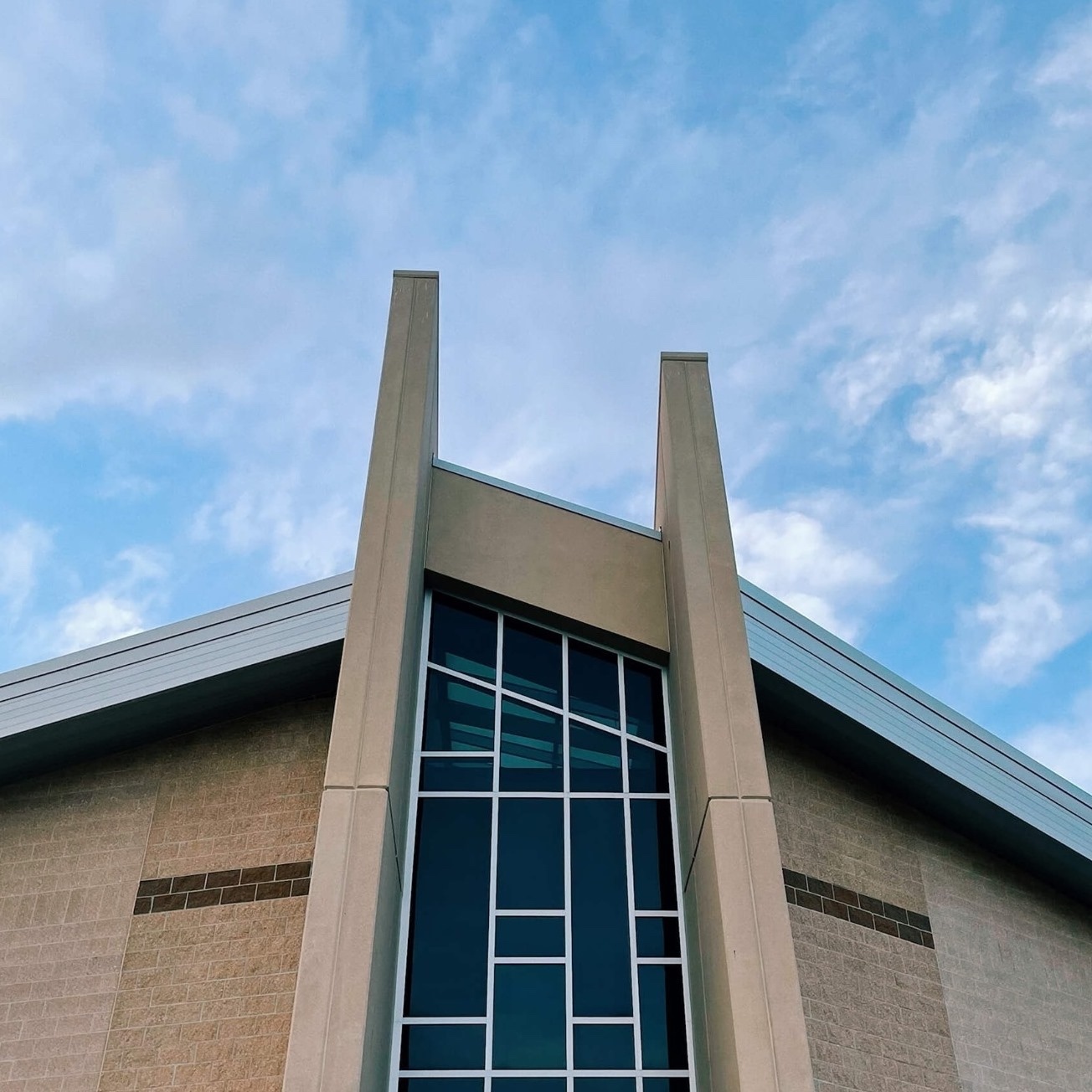Episodes

Wednesday Jul 14, 2021
"Where There is Sadness" (John 16:16-24 ) - July 11, 2021
Wednesday Jul 14, 2021
Wednesday Jul 14, 2021
Make Me An Instrument – The Peace Prayer for Post-Moderns
Hatred. Injury. Doubt. Despair. Darkness. Sadness. We don’t have to look very far to see how these struggles play out every day in our world—and how, every day, we find ourselves in the very midst of such struggles. We live in a world of un-peace. Such un-peace often makes us want to retreat from the world in fear and self-preservation. But what if we lived as those who are called to be instruments of peace, redeeming and transforming whatever spaces and places we happen to be in—and whatever people happen to be there? Join us for this world-changing summer sermon series inspired by St. Francis’ famous “Peace Prayer.” Learn how to train your soul to look outward, to move boldly toward the un-peace of the world, and to bring love, forgiveness, faith, hope, light and joy wherever there is need.
Welcome home. You belong here. At St. Andrew, we embrace Jesus’ message that God loves everyone and affirm that all persons are of sacred worth. We are proud to celebrate diversity as we work to live our vision of radical hospitality. We welcome people of every age, race and gender identity; diverse nationalities, ethnicities, and sexual orientations; any family structure, economic reality, physical and mental ability, education and faith history. While there are differences among us, we can love alike though we may not think alike. You are invited to join this nurturing community on a faith journey toward greater love, understanding and mutual respect.

Tuesday Jul 06, 2021
"Where There is Darkness, Light" (Psalm 139:7-12) - July 4, 2021
Tuesday Jul 06, 2021
Tuesday Jul 06, 2021
Make Me An Instrument – The Peace Prayer for Post-Moderns
Hatred. Injury. Doubt. Despair. Darkness. Sadness. We don’t have to look very far to see how these struggles play out every day in our world—and how, every day, we find ourselves in the very midst of such struggles. We live in a world of un-peace. Such un-peace often makes us want to retreat from the world in fear and self-preservation. But what if we lived as those who are called to be instruments of peace, redeeming and transforming whatever spaces and places we happen to be in—and whatever people happen to be there? Join us for this world-changing summer sermon series inspired by St. Francis’ famous “Peace Prayer.” Learn how to train your soul to look outward, to move boldly toward the un-peace of the world, and to bring love, forgiveness, faith, hope, light and joy wherever there is need.
Welcome home. You belong here. At St. Andrew, we embrace Jesus’ message that God loves everyone and affirm that all persons are of sacred worth. We are proud to celebrate diversity as we work to live our vision of radical hospitality. We welcome people of every age, race and gender identity; diverse nationalities, ethnicities, and sexual orientations; any family structure, economic reality, physical and mental ability, education and faith history. While there are differences among us, we can love alike though we may not think alike. You are invited to join this nurturing community on a faith journey toward greater love, understanding and mutual respect.

Wednesday Jun 30, 2021
"Where There Is Despair" (2 Corinthians 4:1-12) - June 27, 2021
Wednesday Jun 30, 2021
Wednesday Jun 30, 2021
Make Me An Instrument – The Peace Prayer for Post-Moderns
Hatred. Injury. Doubt. Despair. Darkness. Sadness. We don’t have to look very far to see how these struggles play out every day in our world—and how, every day, we find ourselves in the very midst of such struggles. We live in a world of un-peace. Such un-peace often makes us want to retreat from the world in fear and self-preservation. But what if we lived as those who are called to be instruments of peace, redeeming and transforming whatever spaces and places we happen to be in—and whatever people happen to be there? Join us for this world-changing summer sermon series inspired by St. Francis’ famous “Peace Prayer.” Learn how to train your soul to look outward, to move boldly toward the un-peace of the world, and to bring love, forgiveness, faith, hope, light and joy wherever there is need.
Welcome home. You belong here. At St. Andrew, we embrace Jesus’ message that God loves everyone and affirm that all persons are of sacred worth. We are proud to celebrate diversity as we work to live our vision of radical hospitality. We welcome people of every age, race and gender identity; diverse nationalities, ethnicities, and sexual orientations; any family structure, economic reality, physical and mental ability, education and faith history. While there are differences among us, we can love alike though we may not think alike. You are invited to join this nurturing community on a faith journey toward greater love, understanding and mutual respect.

Wednesday Jun 23, 2021
"Where There Is Doubt" (Mark 9:14-24) - June 20, 2021
Wednesday Jun 23, 2021
Wednesday Jun 23, 2021
Make Me An Instrument – The Peace Prayer for Post-Moderns
Hatred. Injury. Doubt. Despair. Darkness. Sadness. We don’t have to look very far to see how these struggles play out every day in our world—and how, every day, we find ourselves in the very midst of such struggles. We live in a world of un-peace. Such un-peace often makes us want to retreat from the world in fear and self-preservation. But what if we lived as those who are called to be instruments of peace, redeeming and transforming whatever spaces and places we happen to be in—and whatever people happen to be there? Join us for this world-changing summer sermon series inspired by St. Francis’ famous “Peace Prayer.” Learn how to train your soul to look outward, to move boldly toward the un-peace of the world, and to bring love, forgiveness, faith, hope, light and joy wherever there is need.
Welcome home. You belong here. At St. Andrew, we embrace Jesus’ message that God loves everyone and affirm that all persons are of sacred worth. We are proud to celebrate diversity as we work to live our vision of radical hospitality. We welcome people of every age, race and gender identity; diverse nationalities, ethnicities, and sexual orientations; any family structure, economic reality, physical and mental ability, education and faith history. While there are differences among us, we can love alike though we may not think alike. You are invited to join this nurturing community on a faith journey toward greater love, understanding and mutual respect.

Wednesday Jun 23, 2021
"Where There is Injury, Pardon" (Matthew 18:15-22) - June 13, 2021
Wednesday Jun 23, 2021
Wednesday Jun 23, 2021
Make Me An Instrument – The Peace Prayer for Post-Moderns
Hatred. Injury. Doubt. Despair. Darkness. Sadness. We don’t have to look very far to see how these struggles play out every day in our world—and how, every day, we find ourselves in the very midst of such struggles. We live in a world of un-peace. Such un-peace often makes us want to retreat from the world in fear and self-preservation. But what if we lived as those who are called to be instruments of peace, redeeming and transforming whatever spaces and places we happen to be in—and whatever people happen to be there? Join us for this world-changing summer sermon series inspired by St. Francis’ famous “Peace Prayer.” Learn how to train your soul to look outward, to move boldly toward the un-peace of the world, and to bring love, forgiveness, faith, hope, light and joy wherever there is need.
Welcome home. You belong here. At St. Andrew, we embrace Jesus’ message that God loves everyone and affirm that all persons are of sacred worth. We are proud to celebrate diversity as we work to live our vision of radical hospitality. We welcome people of every age, race and gender identity; diverse nationalities, ethnicities, and sexual orientations; any family structure, economic reality, physical and mental ability, education and faith history. While there are differences among us, we can love alike though we may not think alike. You are invited to join this nurturing community on a faith journey toward greater love, understanding and mutual respect.

Wednesday Jun 16, 2021
"Where There is Hatred" (Ephesians 4:35-32) - June 6, 2021
Wednesday Jun 16, 2021
Wednesday Jun 16, 2021
Make Me An Instrument – The Peace Prayer for Post-Moderns
Hatred. Injury. Doubt. Despair. Darkness. Sadness. We don’t have to look very far to see how these struggles play out every day in our world—and how, every day, we find ourselves in the very midst of such struggles. We live in a world of un-peace. Such un-peace often makes us want to retreat from the world in fear and self-preservation. But what if we lived as those who are called to be instruments of peace, redeeming and transforming whatever spaces and places we happen to be in—and whatever people happen to be there? Join us for this world-changing summer sermon series inspired by St. Francis’ famous “Peace Prayer.” Learn how to train your soul to look outward, to move boldly toward the un-peace of the world, and to bring love, forgiveness, faith, hope, light and joy wherever there is need.
Welcome home. You belong here. At St. Andrew, we embrace Jesus’ message that God loves everyone and affirm that all persons are of sacred worth. We are proud to celebrate diversity as we work to live our vision of radical hospitality. We welcome people of every age, race and gender identity; diverse nationalities, ethnicities, and sexual orientations; any family structure, economic reality, physical and mental ability, education and faith history. While there are differences among us, we can love alike though we may not think alike. You are invited to join this nurturing community on a faith journey toward greater love, understanding and mutual respect.

Wednesday Jun 02, 2021
"Make Me An Instrument of Your Peace" (1 Peter 3:8-12) - May 30, 2021
Wednesday Jun 02, 2021
Wednesday Jun 02, 2021
Make Me An Instrument – The Peace Prayer for Post-Moderns
Hatred. Injury. Doubt. Despair. Darkness. Sadness. We don’t have to look very far to see how these struggles play out every day in our world—and how, every day, we find ourselves in the very midst of such struggles. We live in a world of un-peace. Such un-peace often makes us want to retreat from the world in fear and self-preservation. But what if we lived as those who are called to be instruments of peace, redeeming and transforming whatever spaces and places we happen to be in—and whatever people happen to be there? Join us for this world-changing summer sermon series inspired by St. Francis’ famous “Peace Prayer.” Learn how to train your soul to look outward, to move boldly toward the un-peace of the world, and to bring love, forgiveness, faith, hope, light and joy wherever there is need.
Welcome home. You belong here. At St. Andrew, we embrace Jesus’ message that God loves everyone and affirm that all persons are of sacred worth. We are proud to celebrate diversity as we work to live our vision of radical hospitality. We welcome people of every age, race and gender identity; diverse nationalities, ethnicities, and sexual orientations; any family structure, economic reality, physical and mental ability, education and faith history. While there are differences among us, we can love alike though we may not think alike. You are invited to join this nurturing community on a faith journey toward greater love, understanding and mutual respect.

Tuesday May 25, 2021
We Belong: "We Belong to Each Other" (5/23/2021)
Tuesday May 25, 2021
Tuesday May 25, 2021
Do you ever feel like you don’t belong?
Do you ever wonder where in the world you do belong?
You’re not alone. The world has never been more connected, yet people are lonelier than ever. Whether we feel unworthy, alienated, anxious or uncertain about our place in the world — the absence of belonging is the silent, hidden wound of our times.
Most people think of belonging as a place, and they spend a lifetime searching for it in vain. But what if belonging isn’t so much about a particular place, but about the divine and human connections that can help make us feel at home, wherever we happen to be?
Join us for this timely, urgent series as we explore the source, nature, and promise of belonging in a disconnected world.

Tuesday May 18, 2021
We Belong: "We Belong to the Spirit of Truth" (5/16/21)
Tuesday May 18, 2021
Tuesday May 18, 2021
Do you ever feel like you don’t belong?
Do you ever wonder where in the world you do belong?
You’re not alone. The world has never been more connected, yet people are lonelier than ever. Whether we feel unworthy, alienated, anxious or uncertain about our place in the world — the absence of belonging is the silent, hidden wound of our times.
Most people think of belonging as a place, and they spend a lifetime searching for it in vain. But what if belonging isn’t so much about a particular place, but about the divine and human connections that can help make us feel at home, wherever we happen to be?
Join us for this timely, urgent series as we explore the source, nature, and promise of belonging in a disconnected world.

Tuesday May 11, 2021
We Belong: "We Belong to the Way of Love" (5/09/21)
Tuesday May 11, 2021
Tuesday May 11, 2021
Do you ever feel like you don’t belong?
Do you ever wonder where in the world you do belong?
You’re not alone. The world has never been more connected, yet people are lonelier than ever. Whether we feel unworthy, alienated, anxious or uncertain about our place in the world — the absence of belonging is the silent, hidden wound of our times.
Most people think of belonging as a place, and they spend a lifetime searching for it in vain. But what if belonging isn’t so much about a particular place, but about the divine and human connections that can help make us feel at home, wherever we happen to be?
Join us for this timely, urgent series as we explore the source, nature, and promise of belonging in a disconnected world.

